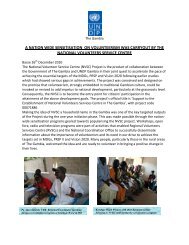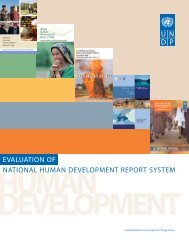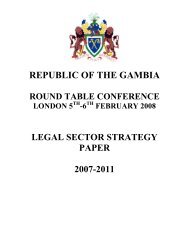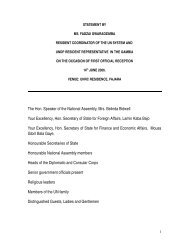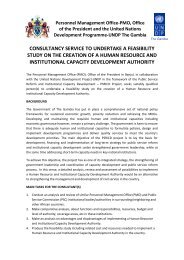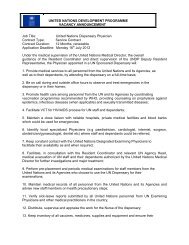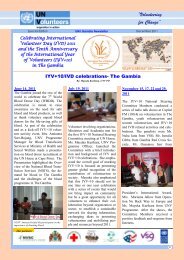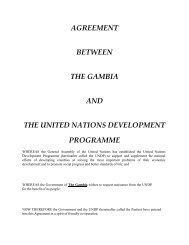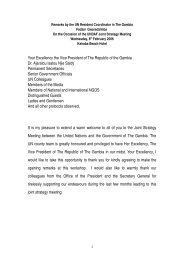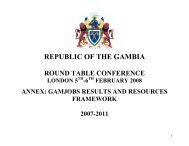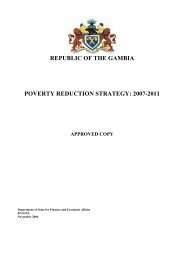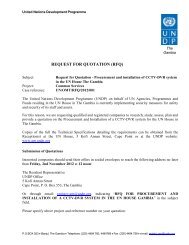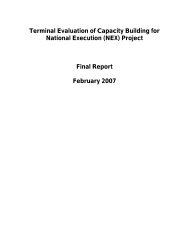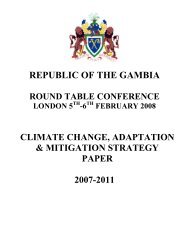Introduction - UNDP The Gambia
Introduction - UNDP The Gambia
Introduction - UNDP The Gambia
Create successful ePaper yourself
Turn your PDF publications into a flip-book with our unique Google optimized e-Paper software.
________________________________________________________________________________________________________________________<br />
collected in the field regarding the<br />
reproductive health of women are stories of<br />
TBAs who are confronted with the daily<br />
scourge of some of the traditional practices in<br />
their communities. Raising their<br />
consciousness about such issues has made<br />
some positive changes on women’s health<br />
and well-being.<br />
Civil society organisations have used these<br />
existing structures as their entry points for the<br />
development of the local<br />
communities. Notable among the local NGOs<br />
are GAMCOTRAP, BAFROW and the<br />
<strong>Gambia</strong> Family Planning Association. <strong>The</strong>se<br />
NGOs have projects working with<br />
circumcisers and their assistants in improving<br />
women’s health. Systematic and effective<br />
engagement with the TBAs and herbalists<br />
will contribute to achieving the set target for<br />
the MDGs in a sustainable manner.<br />
Griots: Griots are historically regarded as<br />
custodians of the country’s oral traditions.<br />
Over the years, they have nurtured a highly<br />
retentive memory to narrate events and stories<br />
to people. <strong>The</strong>y are outstanding in giving<br />
eyewitness accounts of events, and are able to<br />
do this through oral narrations, songs/music<br />
and poetry. <strong>The</strong>y have also lived through<br />
generations of families whose history they are<br />
specialised in. Thus they form the repository<br />
of knowledge of the oral history of the<br />
villages, towns and districts throughout the<br />
country.<br />
Some griots have been able to record events<br />
in the local language and have been reference<br />
points to community leaders regarding some<br />
important events. Foreign anthropologists<br />
have referred to them on many occasions.<br />
<strong>The</strong>y contribute to both the traditional and<br />
colonial history in the communities despite<br />
the low social status accorded them<br />
culturally.<br />
Currently, the Department of State for<br />
Education, under its girls’ education<br />
programme, uses griots to promote girls’<br />
education in the various languages. Some of<br />
them constitute themselves into theatre<br />
groups to promote some of the development<br />
issues through popular theatre.<br />
<strong>The</strong> Jammeh Foundation for Peace, under its<br />
Girls’ Education Scheme, used the skills of<br />
the griots to sensitise communities to the<br />
education of girls. However, the creative use<br />
of this critical group will require developing<br />
their capacity to move from retention to<br />
documenting events accurately without being<br />
influenced by the subjectivities of individuals,<br />
regimes and self-interest.<br />
Kanyelengo: <strong>The</strong> kanyelengo are generally a<br />
group of women who symbolically identify<br />
themselves in various forms. Culturally, they<br />
believe that after several stillbirths or loss of<br />
their babies at infancy, they are ‘unlucky’,<br />
and that a supernatural being is in control. As<br />
such, they are always pleading for support<br />
through their songs and drama, which carry<br />
powerful messages that are didactic in nature.<br />
It is also a cult which tries to respond to their<br />
infertility by engaging themselves in prayers<br />
in order to attain their desire to bear children.<br />
As a result, they are very good at creating<br />
songs and metonymic expressions that carry<br />
sensitive and powerful messages about their<br />
plight. This groups of people can be very<br />
useful agents of change if effectively engaged<br />
to take part in creating awareness about<br />
reproductive health and other development<br />
activities.<br />
<strong>The</strong> kanyelengo are important development<br />
targets in the fight against HIV/AIDS<br />
programmes currently being run by the NGOs<br />
and CBOs at the community level. <strong>The</strong><br />
National Aids Secretariat has been supporting<br />
programmes geared towards this group.<br />
Women’s rights organisations have always<br />
used them in their empowerment programmes<br />
to come up with songs regarding family<br />
planning, early marriages, teenage<br />
pregnancies and other gender-specific issues<br />
in the local languages.<br />
In a highly illiterate society such as <strong>The</strong><br />
<strong>Gambia</strong>, the kanyelengo can be very effective<br />
in the rural areas as they are culturally<br />
relevant and acceptable because the issues<br />
________________________________________________________________________________________________<br />
Building Capacity for the Attainment of the Millennium Development Goals in <strong>The</strong> <strong>Gambia</strong> National Human Development Report 2005<br />
54



